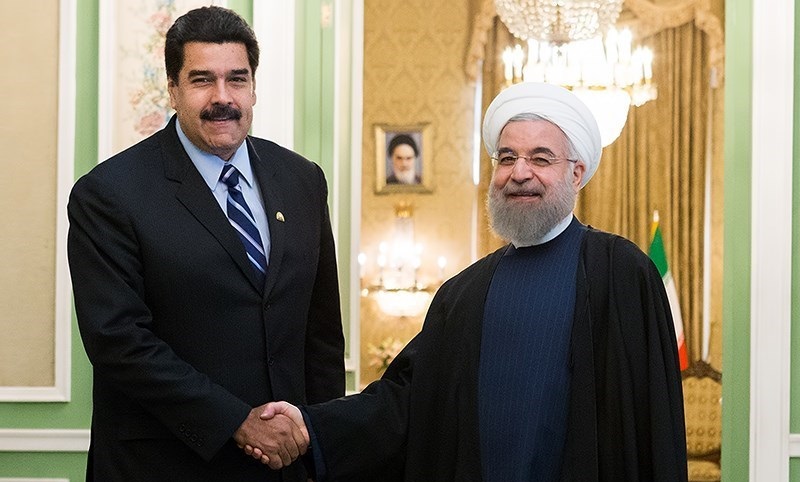 CC Image Credit: Tasnim News Agency https://bit.ly/31TEx2y
CC Image Credit: Tasnim News Agency https://bit.ly/31TEx2y
Iranian PMUs in Venezuela
Recent months have seen Iranian-Venezuelan relations continue a partnered defiance against U.S. sanctions. Their current relationship, forged out of mutual interest, stems from imposed economic isolation and an intention to undermine U.S. policy and influence. Concerningly, reports have surfaced that Iran is also helping Venezuela form Popular Mobilization Units (PMUs), a complex aggregation of militias which have historically helped Iran project influence in Iraq and Syria. Though it is unlikely that Iranian-backed PMUs in Venezuela will successfully exert influence as they have in Iraq, they still pose a threat for Latin American security and highlight the unpredictable implications that hardline economic sanctions can have on authoritarian regimes.
A Brief Background on PMUs in Iraq
PMUs are umbrella organizations composed of independent militias of varying political and religious allegiances operating under official Iraqi government authority. Largely due to their popular role in combatting ISIS in Iraq, PMUs have become a permanent feature of Iraq’s social, political, and security landscape. For many Iraqis, PMUs are viewed with reverence and respect as many citizens have relatives who have fought in PMUs to defend Iraq. However, the complex nature of Iranian influence within PMUs only further complicates the organization’s legitimacy as an Iraqi institution.
Since their emergence in 2014, PMUs have been utilized to increase Iranian influence in Iraq and Syria. Although consisting of factions with differing affiliations and loyalties, the real distinction between militias is their allegiance to Iran. Some of the most capable (financial and operational) militias within PMUs consist of Iranian-backed Shiite elements, which are supported by the Islamic Revolutionary Guard Corps (IRGC) and see themselves as allies in Iran’s broader geopolitical ambitions. Iranian-backed militias, such as Kataib Hezbollah, are considered a threat to the legitimacy of the Iraqi government by holding a territorial monopoly over the use of force within Iraq. This consequently undermines years of U.S. policy efforts to build security and governance capacities within the Iraqi government.
Iranian-Venezuelan Relations
As Iran and Venezuela find themselves further isolated, due largely to the Trump administration’s “maximum pressure” sanctions campaign, their relationship has morphed into a coping mechanism to withstand sanctions and undermine U.S. policy and influence. While Venezuela’s relationship with Iran primarily serves as an economic lifeline, Iran sees Venezuela as an opportunity to create and exert economic, diplomatic, and military influence in Latin America. Iran’s increasing military-to-military involvement, including mobilization of Iran’s Quds Force to help develop intelligence and military capacities and the use of PMUs, highlights the unpredictable nature of the relationship and the implications it could pose for Latin American security.
Iranian PMUs in Venezuela
The intended use of Iranian-backed PMUs in Venezuela adds an interesting dynamic to this complex relationship. However, it is unclear whether PMUs can exert similar influence in Venezuela as they have in Iraq.
The first aspect of this question falls on the intended goals of Iranian-backed PMUs in Iraq and Venezuela. Iran has a historically adversarial relationship with Iraq and has utilized PMUs to moderate Iraqi power, legitimacy, and influence. With Venezuela, Iranian-backed PMUs could instead work to increase the legitimacy and influence of the Maduro regime. Though the intended goal of each campaign is different, Iran is still maintaining the same guidelines: exert Iranian influence via ambiguous military capacity in a region seemingly “deserted” (whether through troop withdrawal or increasing economic sanctions) by the U.S.
Another, more complex, aspect is the potential immersion of PMUs in either an official or societal capacity. The integration of PMUs into Iraqi society was organic, as it was based on a nationalistic call-to-arms to combat ISIS, which threatened public safety and national stability. The situation in Venezuela is entirely different, based more on economic collapse as a direct result of government policy. However, if PMUs are able to raise the legitimacy of the Maduro regime in the eyes of Venezuelans, their legitimacy could indirectly rise. Importantly, the realistic range of impact and influence will likely be diminished by increasing sanctions, arms embargos, and a closer focus on Iranian-Venezuelan relations, particularly as concerns over weapons sales between the countries have increased.
Though it is unclear how successful Iranian-backed PMUs in Venezuela could fare, their potential still poses a concern for U.S. security in terms of capacity and influence-based unpredictability. Further, the influx of Iranian-backed PMUs into Venezuela, a potential implication of budding relationships between adversarial states, could be viewed as a consequence of an economic sanctions strategy which lacks foresight. This should warrant a thoughtful assessment of the usefulness derived from hardline sanctions on these regimes and the potential consequences they could generate.






